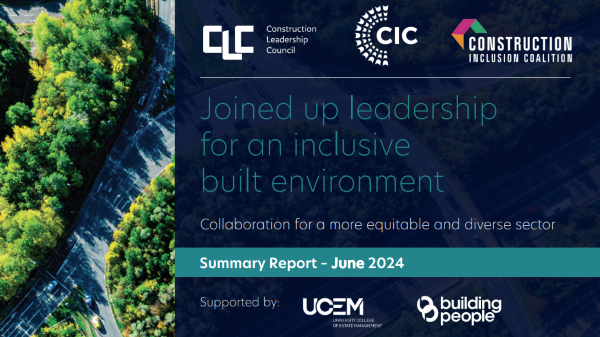UCEM report recommends collaboration for an inclusive built environment
Posted on: 6 June, 2024

UCEM has published a report titled ‘Joined up leadership for an inclusive built environment’ recommending reforms to help the sector work more cohesively to increase the recruitment, retention and success of those from an array of diverse backgrounds.
This report captures the outcomes of collaborative discussions held at UCEM’s most recent ‘INSPIRE’ event, which was supported by the Construction Leadership Council, Construction Inclusion Coalition, Construction Industry Council and Building People.

The day saw the participation of 75 experts, all committed to shaping a more inclusive future for the sector, from organisations such as Bidwells, Black Females in Architecture, CIAT, CIOB, Freehold LGBT+, Greater London Authority, Heathrow, Jhive, Lendlease, Mace, NHBC, RICS, RTPI, Savills, Skanska UK, Sir Robert McAlpine, Queen Mary University and Women in Property, amongst many others
Event insights: shaping an inclusive future together
Across the event’s agenda, there was a particular focus on bringing together those involved in sector-wide EDI initiatives to support a strategic approach that avoids duplication of effort, encourages joined-up expert leadership and achieves a ‘one voice’ approach towards EDI strategy in construction and the built environment.
Discussions and group workshop exercises spanned innovative strategies and leadership, existing cross-sectoral equity, diversity and inclusion initiatives and how these could be amplified to embed more inclusive systems and processes throughout the sector, both across its various specialisms and amongst organisations of all sizes.
Alongside speakers and panellists from major sector coalitions, industry, professional bodies, including the Royal Institution of Chartered Surveyors (RICS) and Chartered Institute of Building (CIOB), the event also heard from Marsha Ramroop, Executive Director of EDI at Building People, a hub aiming to create a centre for excellence in EDI in the Built Environment, who argued that the sector needed to realise “inclusion isn’t about other people and their identities, it is about the sector and its behaviours”.

Misa von Tunzelman, UCEM’s Lead Trustee for EDI and a Board Member of Freehold LGBT, a forum for lesbian, gay, bisexual and transgender real estate professionals, reflected on her career experiences as both a mixed race and bisexual professional in real estate, emphasising the need for more joined-up thinking over EDI spanning construction, property and built environment professions, arguing “the more we work together, whatever our specialism, the lighter the work will be”.
Read more: UCEM conference proposes collaboration to foster built environment inclusivity
Laying the foundations for diversity
Although the built environment industry is beginning to diversify, the report identifies several barriers holding back progress. These were the lack of aligned standards for collecting EDI data, members of historically minoritised communities who undertake built environment education or training but then decide not to pursue a long-term career in the sector and the lack of consistent standards concerning EDI policies, practices and behaviours.
Seeking to suggest actions to overcome these barriers, the report proposes:
- Unified EDI Data Framework: Establishing a sector-wide approach to collecting, sharing, and analysing EDI data, to establish benchmarks laying the groundwork for informed and targeted collective actions.
- Voluntary reporting of key EDI data: Larger employers and major projects should report on areas such as pay gaps, modelled on the UK’s mandatory gender pay gap reporting regime.
- Cooperation to improve retention of diverse cohorts between education and employment: The sector should consider pan-sector outreach, work experience and professional mentorship schemes to encourage those from marginalised communities in built environment education to join the industry and see it as a long-term career.
- Embedding of EDI into routine industry practice: Criteria around increasing diversity should be included in processes such as employee appraisal and clients commissioning, or consultants pitching for, built environment projects.
- Defining EDI standards by professional bodies and education/training providers: Major professional bodies should define EDI standards and competencies, mandated for all practitioners. These standards should be aligned with education/training providers so that these competencies can be incorporated into education and professional qualification curricula.
Read the report and recommendations in full: ‘Joined up leadership for an inclusive built environment’ report is available now.
 Welcoming the report, Ashley Wheaton, UCEM’s Vice Chancellor, said “There is a huge amount of work across the built environment to make a more equitable, diverse and inclusive sector a reality. Perhaps the challenge is to channel that collaboration and increase its impact via collective action. This report aims to identify opportunities for such collaboration and provide recommendations on how this cooperation could be realised to bring about meaningful change.”
Welcoming the report, Ashley Wheaton, UCEM’s Vice Chancellor, said “There is a huge amount of work across the built environment to make a more equitable, diverse and inclusive sector a reality. Perhaps the challenge is to channel that collaboration and increase its impact via collective action. This report aims to identify opportunities for such collaboration and provide recommendations on how this cooperation could be realised to bring about meaningful change.”





